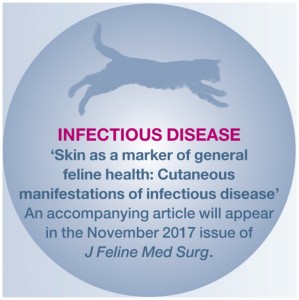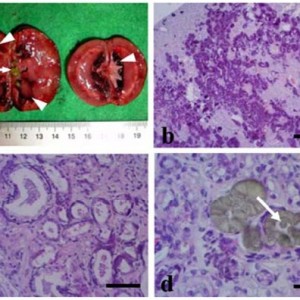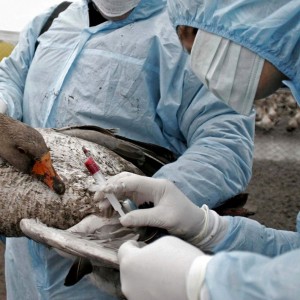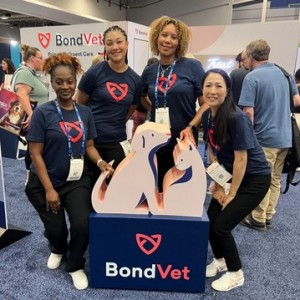Unveiling the evolution, emergence of GI parasites: Antech veterinarians discuss latest research
by Mary Guiden
Two veterinarians from Antech presented updates on emerging and evolving GI parasite findings in dogs and cats at the recent ACVIM Forum in Philadelphia.
Drs. Michelle Evason and Kelly Mitchell, small animal internists, discussed case studies and research related to KeyScreen, the company’s GI parasite diagnostic product that uses PCR (polymerase chain reaction).
Antech was one of the sponsors of the ACVIM Knowledge Center, which offered short educational talks, in the Exhibit Hall.
GI parasites emerging in new geographic areas
Mitchell said that GI parasites in small animals are common. This includes hookworms, roundworms, whipworms and giardia. These parasites are evolving and changing, with some emerging in new geographic areas.
At the same time, diagnostics are evolving, she said, touting the use of KeyScreen, which detects 20 GI parasites. KeyScreen also detects two times more infections when compared to in-clinic fecal flotations, according to the website. In addition, the platform can determine the zoonotic potential of giardia.
The veterinarian presented data from a subset of KeyScreen testing completed in dogs and cats between March to December 2022 (Leutenegger CM, et al. ACVIM 2023). In the U.S., more than 14% of the samples detected giardia in dogs, and 7.4 % was detected in cats.
Toxacara was detected in 1.2% of canines and was as high as 4% in cats. Toxocariasis is caused by roundworm parasites.
These numbers translate to GI parasites being detected in 1 in 4 dogs, and 1 in 5 cats.
Mitchell pointed out that the animals tested are “well cared for pets,” hinting that the situation could be even more dire for feral animals or ones that are not doted on as much.
Multiple breeds affected by parasites
Hookworms were detected in 2.5% of canine submissions, said Evason. And more than 11% of these cases had the KeyScreen benzimidazole resistance marker detected. So far, the company has found resistant hookworm strains in more than 72 dog breeds.
“We are seeing this across the country,” said Evason. “It’s not just a greyhound or Florida problem.”
KeyScreen, she said, offers rapid fecal test turnaround time for veterinary teams. It has a small and stable sample requirement, and the company follows expert- and evidence-based guidelines for GI parasite preventive care in dogs and cats.
The veterinarians said she and Mitchell hope to raise awareness about parasite frequency, emerging GI parasites, antimicrobial resistance and stewardship and zoonotic concerns.
“We want to be part of One Health,” she said. “Pick up the poop, please. We want to be part of the solution and that begins with awareness.”
It's a 'global risk': experts
Evason discussed several case studies detected with KeyScreen to show the prevalence of these emerging and evolving parasites. Among them, she described new puppy Liam, who lives in Canada and was found to have the hookworm benzimidazole resistance marker. She encouraged veterinarians to discuss hookworm treatment resistance, when appropriate.
Several of the maps displayed during the session were created by Dr. J. Scott Weese, DVM and a professor at Ontario Veterinary College at the University of Guelph.
Evason said they’ve now identified over a dozen dogs in Canada with BZ resistance genetic marker F167Y. Estimates are that the prevalence is 11% in the U.S. and may be up to 4% in Canada.
Five of the identified dogs had no travel history outside of Canada. Six dogs were imported from the U.S. and one dog was from Barbados.
In terms of clinical signs, many of the dogs presented with diarrhea and soft stools. Most of them improved with treatment. Some dogs had no clinical signs. All dogs were treated with anthelmintics, including BZ (fenbendazole, febantel).
The capacity of the surveillance data is impressive, she said noting that detecting emergence or spread of these parasites was the result. With the Canada resistance marker, it’s not just due to dogs being imported from the U.S., she said.
“This highlights the global risk potential as well,” she added.
Evason said the American Association of Veterinary Parasitologists (AAVP) Hookworm Taskforce will provide its recommendations soon.
“It needs to happen,” she said, and include “testing and environmental cleanup in dogs with resistance hooks.”
Evason also shared case details for Baby, a 13-month-old working border collie from Western Canada.
The dog had known exposures to foxes, coyotes and rodents and works on a sheep farm. Baby was fed at times a raw meat-based diet and was known to feed off an occasional sheep carcass.
Baby’s DVM submitted a fecal sample using KeyScreen, and the lab detected Echinococcus multilocularis.
Novel case highlighted in JAVMA
The case, “Novel molecular diagnostic (PCR) diagnosis and outcome of intestinal Echinococcus multilocularis in a dog from western Canada,” was published online in JAVMA in May 2023. Evason was the corresponding author and Mitchell was part of the research team. They collaborated with researchers from the Western College of Veterinary Medicine at the University of Saskatchewan and Ontario Veterinary College, University of Guelph and lead Antech researcher Dr. Christian Leutenegger.
Evason said that Baby’s condition improved within 48 hours. Ten days later, a PCR test detected no parasites. The client was advised by their veterinarian (in collaboration with the Antech team) about ways to mitigate environmental exposure, the potential zoonotic exposure risk and public health officials were notified.
The detection of E. multilocularis in dog fecal samples means these animals can serve as sentinels for human exposure risk.
As of June 2023, the team has detected up to five cases across the U.S. and British Columbia. including in Chicago, Boulder (Colorado) and in Washington state.
Evason also discussed a case in which a fecal test detected raccoon roundworm, Baylisascaris procyonis.
It can be uncomfortable for veterinarians to talk with clients about this roundworm, she said. Although it rarely causes disease in dogs, when it does cause disease, it can cause a truly awful disease. The same thing is true of people, and awareness of risk and taking steps to reduce these is key..
According to the CDC, this type of roundworm can cause a rare but serious cause of neurologic and ocular disease in humans.
Evason underscored the importance of discussing preventive care with clients, following recommendations for fecal screening and guidelines and the importance of having exposure risk conversations with pet owners, to bring One Health into conversations.
To date, the team has identified 45 of these raccoon roundworm cases in dogs, one in a cat and one in a skunk.
Learn more about KeyScreen at: https://www.antechdiagnostics.com/














List
Add
Please enter a comment